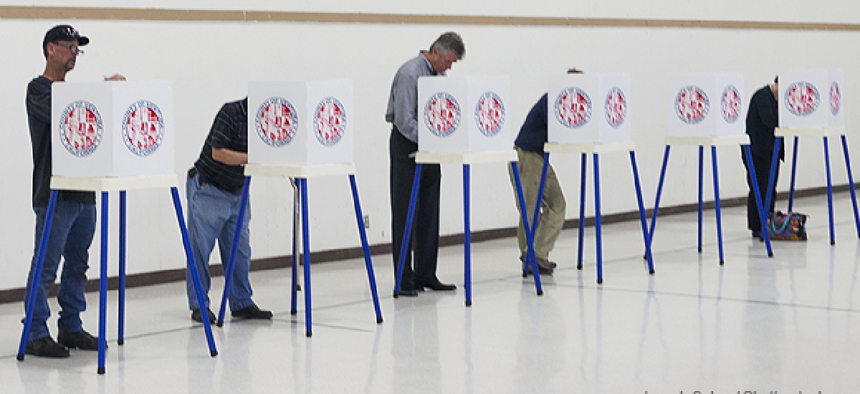Will America’s voting machines make it through the next election?


Connecting state and local government leaders
A recent report by the Brennan Center for Justice found that 43 states are using voting machines that will be at least 10 years old by November 2016 -- raising the risk for Election Day delays, lost ballots and worse.
With the 2016 presidential election a little over a year away, election officials fear that most states’ voting machines are nearing or well beyond their expected lifespans.
According to a report by the Brennan Center for Justice, electronic voting machines can function reliably for 10 to 20 years, with most systems' lifespans on the shorter end of that spectrum. Yet 43 states are using some voting machines that will be at least 10 years old in 2016. In 14 states, some machines are 15 years old.
For the states using machines that are no longer being manufactured, it becomes increasingly difficult to find replacement parts if something goes wrong. Some of the PC-based systems are still running on Windows 2000, Windows XP and earlier operating systems. And when voting machines are based on outdated and unsupported software, election officials often find it difficult or impossible to connect the machines to more modern IT systems.
What could possibly go wrong?
A voting machine the goes offline can cause long lines and wait times at the polling place, of course, but the report warns that the risks extend far beyond voter inconvenience. A potentially faulty machine brings with it an increased risk of crashes, flipped votes, missed or lost votes and overall miscounts.
There are also security issues. When Wi-Fi-enabled WinVote machines crashed in Virginia, for example, the wireless cards made the voting system susceptible to breaches from a nearby location, according to a report by the Virginia State Board of elections in 2014. Specifically, the report noted that an attacker could join the ad-hoc network, steal voting data or let a virus loose. As a result of the post-election investigation, the state decertified the WinVote machines, which has forced 30 Virginia localities to purchase new machines.
Although the WinVote system is from the early 2000s when Wi-Fi standards were not as strict as they are today, the vulnerabilities marked the most recent high-profile example of faulty older machines.
Three takes on the upgrade challenge
The obvious solution is to upgrade to new systems that -- given the advancements in technology over the last decade or more -- promise a more reliable, usable and less expensive approach.
However, insufficient funding for new machines, security concerns and restrictive guidelines and policies make it difficult for some states to transition. The report estimated the initial cost of replacing equipment within the next few years could exceed $1 billion.
According to the report, 31 states want to purchase new voting machines in the next five years, but officials from 22 of those states said they don’t know how they would pay for them. Some localities, however, are finding ways to make the change -- using commercial-off-the-shelf (COTS) hardware to provide both inexpensive and more reliable solutions.
Los Angeles County, for example, in 2012 took to changing its ballot-tabulating system dating back to the late 1960s. Rather than go to outside vendors, the county instead designed its own system with a “human-centered” focus.
The design combines touchscreen technology with an auditable paper ballot, so voters can use the touch screen ballot marker, print out the ballot and place it in a ballot box. The system, which is still in the planning stages, would be flexible enough to adapt to changes in election laws or procedures and make risk-limiting audits easier.
The county plans to use open-source software, which will be maintained by the Information and Technology Department in the registrar’s office, and after contracting the device to a manufacturer, plans to begin implementation in 2017.
Travis County, Texas, also designed its own system. STAR-Vote (STAR stands for Secure, Transparent, Auditable and Reliable) uses a COTS tablet device running open-source software as an electronic ballot, and voters can confirm choices on a printed-paper receipt that is then fed into a scanner. Voters can even log into a website at home to make sure their ballots were counted.
According to the report, the county estimates STAR-Vote will cost about $8 million, nearly $6 million less than a vendor’s system. The county is currently in the request-for-information phase of development and hopes to have the system in place for the 2018 general election.
Denver is also testing a system that allows voters to cast ballots on tablet devices and then print selections on a COTS printer. Disabled voters can even bring their own accessibility device to the polling center and connect to a tablet via Bluetooth.
If jurisdictions cannot purchase new machines, the report recommends ensuring that current machines are stored and transported correctly, adopting best practices for maintenance, updating pre-election machine testing, updating procedures for post-election audits and creating contingency plans and poll-worker training for system failures.
For those counties that can budget for new equipment, the Brennan Center suggests open-source software solutions like those mentioned above; long-term planning to negotiate price and implementation, deploying machines earlier to prepare for presidential elections; designing agile systems to easily add innovations; and using COTS devices to reduce cost and keep up with today’s technology.
The report does warn that, while COTS devices tend to cost less initially, this approach does require heavy IT departmental resources at the local level and an increased focus on security initiatives. But if more states and counties were able to take similar approaches to Los Angeles, Travis County and Denver and transition to newer technologies, the risk of voting machine failure could greatly decline -- and in the end, cost the states less.




